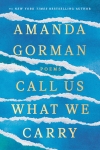Words do matter, especially if they are as powerful and political as Amanda Gorman’s poems featured in her latest collection Call Us What We Carry. Caught between the collective and the individual, Gorman has created a unique voice whilst paying homage to Black history and art.
By Emily Lüter
Picture: Chairman of the Joint Chiefs of Staff from Washington D.C, United States, CC BY 2.0, via Wikimedia Commons, cropped
Canary-yellow jacket, bright red headband – that is how the world was introduced to the first National Youth Poet Laureate Amanda Gorman as she performed The Hill We Climb at the inauguration ceremony of President Biden. It was not the President himself who received the sole attention of media coverage in the following days nor was Lady Gaga’s interpretation of the national anthem. It was this young woman, whose hands moved like a pair of birds, that shook the audience and listeners across the water to their core with her words of grace.

Amanda Gorman
Call Us What We Carry
Penguin RandomHouse: New York 2021
240 pages, 24,99$
Having graduated from Harvard University cum laude and further proven her talent at the Presidential inauguration, Amanda Gorman has now published her first collection of poems Call Us What We Carry. With a mind-boggling ability to capture in words her feelings and thoughts on what it means to be human and live in a community of humans during a pandemic, her performances and texts resonate with people all over the world – and make us realise that no matter where we live, facing history, mutual understanding, and healing are universally important.
Requiem
The first part of the collection is called Requiem; a requiem for the American dream of love and happiness; a requiem for whom and what we have lost in this pandemic; a requiem for the pain hidden in history. But Gorman’s words also carry hope and end with Resolution, which is a lyric rebirth envisioning a future full of healing – both within ourselves individually and within the collective. For the individual cannot be separated from their environment and neither can they be understood stripped bare of their history, both personal and national.
At times over half of our bodies/ Are not our own,/ Our persons made vessels/ For non-human cells./ To them we are/ A boat of being,/ Essential./ A country,/ A continent,/ A planet./ A human/ Microbiome is all the writhing forms on/ & inside this body/ Drafted under our life./ We are not me-/ We are we./ Call us/ What we carry.
If the boundaries of our human flesh are transcended and the I becomes We, how much more are we connected to the outside world, to a network of diverse beings?
Amanda Gorman’s poems are a lyric collage that is both intimate and political. She quotes classicist Anne Carson who explains that etymologically »history« means »to ask« and that to ask means to seek one’s place in the stream of human memory. Gorman searches not only for her own place as a young Black woman in modern America but she also takes stock of where the American history has led to on a national level. It is no coincidence that the vigilant reader will detect many references to Abraham Lincoln’s speeches and Hamilton lyrics. Hers is a particularly American rhetoric, at the core questioning the concept of identity in the political frame of a democracy.
City upon a Hill
In researching and writing her poems, Amanda Gorman was heavily inspired by Lincoln’s speeches and other American rhetoricians that run as an echo through many of her texts. The lines »Somehow we do it/ somehow we’ve weathered and witnessed a nation that isn’t broken but simply unfinished« in The Hill We Climb is an appreciative nod to Lincoln’s Gettysburg Address in which he formulates the proposition of a people’s government, the »unfinished« American experiment: »It is for us the living, rather, to be dedicated here to the unfinished work which they who fought here have thus far so nobly advanced.« The very title of the poem, The Hill We Climb, is reminiscent of another famous hill in the American rhetoric. In John Winthrop’s A Model of Christian Charity, it says »For we must consider that we shall be as a city upon a hill. The eyes of all people are upon us.« Winthrop’s idea of America as a chosen nation is decidedly religious, but in Gorman’s poems the hill-metaphor becomes peculiarly Lincolnian when she says, »But while democracy can be periodically delayed/ it can never be permanently defeated/ In this truth/ in this faith we trust«. The juxtaposition of politics and faith can be read as mirror which the poet holds up to American society.
The poems are peppered with nautical metaphors and references which are also very American. Essex I is shaped like a whale and so the most famous literary whale, Moby Dick, finds its way into the collection. Ship’s Manifest can be read as a nod to the settlers’ ships but equally to the sentiment of »sitting in one boat« during this pandemic whereas Manifest Destiny refers to the settlers’ belief that their colonial endeavours were sanctified by Providence. The biblical image of the ark is invoked as well and shows how religion, nautical knowledge, and the American rhetoric are inextricably linked. The intertextualities, whilst not necessary for understanding the poems, add context and render Call Us What We Carry a complex collection of intertexts.
The Power of Poems
President Biden’s inauguration took place mere days after the anti-democratic riot at the Capitol. The symbolic power of his inauguration and especially Amanda Gorman’s words full of hope were all the more potent because the heart of democracy had been attacked so shortly before. Poetry as a genre is inherently a challenge to the existing discourse, subverting language by framing and using it differently. Gorman’s spoken word performance that day reminded us that words and language and literature are not idle, they matter.
Women’s rights activist and Nobel Prize recipient Malala Yousafzai calls Call Us What We Carry a »book of poetry so alive you want to hold it and protect it, to read it all at once, and then immediately read it again.« Gorman’s poems are playful, toying with rhythm and homophones that add layers to the meaning of each word. Every line radiates the joy of language and yet never loses sight of its serious subject matter. In times as uncertain as these Amanda Gorman’s words are a lighthouse that shine through the fog as we feel lost at sea.






